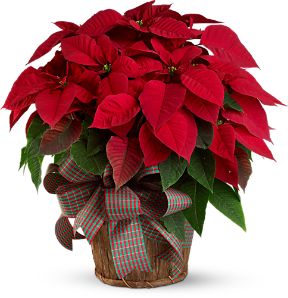Poinsettias Are Not Poisonous
 Today I found out that poinsettias are not poisonous, contrary to popular belief.
Today I found out that poinsettias are not poisonous, contrary to popular belief.
The belief that they are poisonous originally seems to have started around 1919 when a two year old child of a U.S. Army officer died after supposedly eating poinsettia leaves. The poinsettia leaves were blamed for the death, even though there was never any actual evidence that the poinsettia leaves had anything to do with the child dying, according to The American Society of Florists, who looked into the matter at the time.
Since then there hasn’t been any other deaths related to ingesting poinsettia leaves. Indeed, according to the Madison Poison Control Center a 50 pounds child would need to eat 500-600 poinsettia leaves to suffer any sort of serious ill effects from the plant and even then it is likely that the child would only suffer possible cramps, upset stomach, vomiting and/or diarrhea, but would otherwise not need any medical attention.
Further research into this matter was done by the Children’s Hospital of Pittsburgh and Carnegie Melon University, studying just under 23,000 poinsettia related reports to poison control centers across the United States. Not a single one of these reports showed evidence of any actual toxicity from exposure or ingestion of the plant.
If you liked this article, you might also enjoy our new popular podcast, The BrainFood Show (iTunes, Spotify, Google Play Music, Feed), as well as:
- “Mistletoe” Literally Means “Dung Twig”
- Rudolph the Red-Nosed Reindeer was Created by a Department Store
- Brenda Lee was Just 13 When She Recorded “Rocking Around the Christmas Tree”
- The Origin of the Candy Cane
- The Character of “George Bailey” on “It’s a Wonderful Life” was Partially Based on the Founder of Bank of America
Bonus Facts:
- According to the American Society of Florists, no other consumer plant has been tested for toxicity more than the poinsettia.
- The Aztecs used the poinsettia to produce antipyretic medication as well as red dye.
- December 12th is National Poinsettia Day
- The Poinsettia plant was named after Joel Robert Poinsett, who was an American ambassador to Mexico around 1829. Poinsett was an amateur botanist and liked the plant so much that he sent several back to his home in South Carolina where he grew them in his green house and introduced the United States to the plant.
- In Central America, however, the poinsettia is known as “Flores de Noche Buena” which means “Flower of the Holy Night”.
- The Ecke family of Encinitas, California has had a virtual monopoly on poinsettia sales since the early 1900s due to the fact that they had discovered a way to create compact, fuller poinsettias by grafting two varieties of poinsettia together. Other poinsettias sold tended to look more like the weeds they are. In the 1990s however, a University researcher discovered this method and published it. Since then, other poinsettia growers and distributors have popped up, but the Ecke family still sells about 70% of all poinsettias sold in the United States and about 50% of the world wide sales.
- The poinsettia’s association with Christmas began sometime in the 16th or 17th century. Friars in Mexico included the plants in their Christmas celebrations with the star shaped leaf pattern symbolizing the star of Bethlehem and the red color representing the blood shed by Jesus through his crucifixion. This tradition of using poinsettias in the holidays was eventually popularized in the United States when Paul Ecke Jr, began sending free poinsettias to television stations for them to display on the air during the Thanksgiving and Christmas season. He also appeared himself on various TV shows marketing the plants.
- Thom David, marketing manager of the Paul Ecke Ranch, occasionally puts on demonstrations where he eats several leaves from poinsettia plants in front of groups of people who refuse to believe him when he says they are not poisonous. He does however say they are incredibly bitter and one of the most disgusting tasting things he’s ever eaten.
- The red part of the poinsettia plant is often thought by people to be flower petals, but in fact they are leaves.
- The American Veterinary Medicine Association does not include poinsettias on its list of plants that are dangerous to animals.
| Share the Knowledge! |
|





No one things they are poisonous to humans. Everything thinks they are poisonous to cats.
Could this possibly vary in toxicity for animals?
La Noche Buena is Christmas Eve. So basically it is known as “Christmas Eve’s flower.”
When I was a kid we found an abandoned cage with about six rabbits dumped in a wooded area. We brought them home and raised them as pets until
Christmas time when they ate poinsettia leaves( we would bring them inside were it was warm and let them run around every day). All but one died very quickly. So I’m pretty sure they are lethal to rabbits.
For those interested Antipyretic is a fever reducing:
https://en.wikipedia.org/wiki/Antipyretic